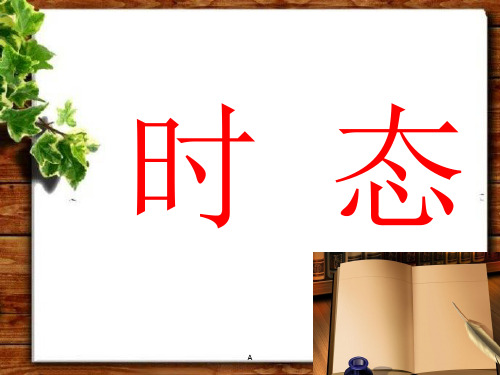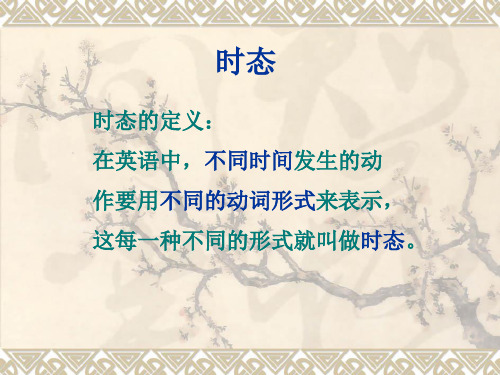一般现在时和现在进行时PPT
合集下载
初中英语8大时态ppt课件

.
e.g.Has she any experience in teaching piano lessons?(√) Does she have any experience in teaching piano lessons? (√) 她有教钢琴的经验吗?
Had you a good time going hiking yesterday?(×) Did you have a good time going hiking yesterday?(√)
you/ they working?
.
Is he/ she/ it not working?或Isn’t
he/ she/ it
working?
现在分词的变法有:
1)、一般在动词词尾加上-ing , E.g. jump---jumping
2)、以不发音字母e结尾的动词,先去e,再加ing. E.g have---having
表示过去经常发生的动作,也 可用“used to do ”和“would +动词原形”。
.
肯定式
疑问式
否定式疑问否定式I源自wasateacher.
Was I a I was not
teacher? teacher.
a
Was I not a teacher?
He/ She was a
teacher.
It was Mary.
We/ You/ They
were teachers.
Were we/ We/ You/ They Were we/ you/ they not
you/ they were not/
teachers?或Weren’t we/
teachers?weren’t teachers.you/ they teacher?
e.g.Has she any experience in teaching piano lessons?(√) Does she have any experience in teaching piano lessons? (√) 她有教钢琴的经验吗?
Had you a good time going hiking yesterday?(×) Did you have a good time going hiking yesterday?(√)
you/ they working?
.
Is he/ she/ it not working?或Isn’t
he/ she/ it
working?
现在分词的变法有:
1)、一般在动词词尾加上-ing , E.g. jump---jumping
2)、以不发音字母e结尾的动词,先去e,再加ing. E.g have---having
表示过去经常发生的动作,也 可用“used to do ”和“would +动词原形”。
.
肯定式
疑问式
否定式疑问否定式I源自wasateacher.
Was I a I was not
teacher? teacher.
a
Was I not a teacher?
He/ She was a
teacher.
It was Mary.
We/ You/ They
were teachers.
Were we/ We/ You/ They Were we/ you/ they not
you/ they were not/
teachers?或Weren’t we/
teachers?weren’t teachers.you/ they teacher?
一般现在时和现在进行时的区别PPT课件

【时间状语不同】 常与现在进行时连用的时间状语有:now, at the moment; 另外,以Look, Listen 或 Don't ... 等开头的祈使句常常会引出现在进行时的句子。但是, 有时也用一般现在时,要看是表示正在进行的动作还是表示现在的状态。如果表示正在进行的动作就用现在进行时,如果表示现在的状态就用一般现在时。试比较:
动词为双音节或者多音节:最后一个音节为重读音节,以单一元音字母 + 单一辅音字母结尾 辅音字母双写,再加 ing; Beging beginning
以 y 结尾的动词 直接加 ing; Carry carrying Enjoy enjoying
现在进行时
现在进行时的功用
1) 表示说话时正在发生或者进行的动作 Please don’t make so much noise, I’m studying. Let’s get out. It isn’t raining any more. 2) 表示在现在相对较长一段时间内正在进行的动作,但是说话一刻不一定在做的动作 He is building his own house. David is teaching English and learning Chinese in Beijing. 这些动作,在说话时并不一定在发生或进行,而是在包括说话的一刹那在内的一段时间内发生、进行的。
现在进行时是由助动词to be 的现在时 + 现在分词构成现在分词的构成,是在动词原形上加—ing,
动词以单个e 结尾 去掉e, 加 ing Love _lovingArgue _ arguing
动词以 —ee结尾 直接加 ing Agree_ agreeingSee _ seeing
动词为双音节或者多音节:最后一个音节为重读音节,以单一元音字母 + 单一辅音字母结尾 辅音字母双写,再加 ing; Beging beginning
以 y 结尾的动词 直接加 ing; Carry carrying Enjoy enjoying
现在进行时
现在进行时的功用
1) 表示说话时正在发生或者进行的动作 Please don’t make so much noise, I’m studying. Let’s get out. It isn’t raining any more. 2) 表示在现在相对较长一段时间内正在进行的动作,但是说话一刻不一定在做的动作 He is building his own house. David is teaching English and learning Chinese in Beijing. 这些动作,在说话时并不一定在发生或进行,而是在包括说话的一刹那在内的一段时间内发生、进行的。
现在进行时是由助动词to be 的现在时 + 现在分词构成现在分词的构成,是在动词原形上加—ing,
动词以单个e 结尾 去掉e, 加 ing Love _lovingArgue _ arguing
动词以 —ee结尾 直接加 ing Agree_ agreeingSee _ seeing
英语时态8种基本时态讲解.ppt课件

4)动词过去式变化规则。 a)一般情况下的词加-ed. work---worked call----called b)以不发音的字母e结尾的单词直接加-d . live----lived change----changed smoke----smoked die----died graduate----graduated drive----drove
8.过去完成时 表示动作发生在过去某一时间之前已经完成的动作或状态, 强调“过去的过去”, 常与 by the time, by the end of…,before , by 等引导时间的状语连用。
基本结构 主语+ had + 动词过去分词 + 其他成分 When I got to the cinema yesterday the film had begun already. He had learned English before he came here.
现在完成时与一般过去时的区别: 1)现在完成时侧重于对现在的影响;而一般过去时侧重于某一动作发生在过去某个时间或某段时间。即现在完成时侧重于现在的结果,而一般过去时侧重于动作发生的时间。例如:
I have seen the film. 我看过这部电影。(现在我仍记得电影的内容) I saw the film three days ago. 三天前我看了这部电影。(强调是三天前,而不是别的什么时候看的电影)
be going to含有“打算,准备”的意思,而will则没有这个意思, She is going to lend us her book. He will be here in half an hour.
be about to+V.原形(意为马上做某事,在时间上指最近的将来) I am about to leave school. 不能与表示时间的副词连用。 They are about to set out.(√) They are about to set,变y为i加-ed. study----studied carry----carried cry----cried try----tried d)以元音字母+y结尾的单词直接加-ed. play----played stay----stayed
8.过去完成时 表示动作发生在过去某一时间之前已经完成的动作或状态, 强调“过去的过去”, 常与 by the time, by the end of…,before , by 等引导时间的状语连用。
基本结构 主语+ had + 动词过去分词 + 其他成分 When I got to the cinema yesterday the film had begun already. He had learned English before he came here.
现在完成时与一般过去时的区别: 1)现在完成时侧重于对现在的影响;而一般过去时侧重于某一动作发生在过去某个时间或某段时间。即现在完成时侧重于现在的结果,而一般过去时侧重于动作发生的时间。例如:
I have seen the film. 我看过这部电影。(现在我仍记得电影的内容) I saw the film three days ago. 三天前我看了这部电影。(强调是三天前,而不是别的什么时候看的电影)
be going to含有“打算,准备”的意思,而will则没有这个意思, She is going to lend us her book. He will be here in half an hour.
be about to+V.原形(意为马上做某事,在时间上指最近的将来) I am about to leave school. 不能与表示时间的副词连用。 They are about to set out.(√) They are about to set,变y为i加-ed. study----studied carry----carried cry----cried try----tried d)以元音字母+y结尾的单词直接加-ed. play----played stay----stayed
一般现在时与现在进行时ppt课件

• 4. They __h_a_ve___(have) the same hobby.
• 5. My aunt _lo_o_k_s___(look) after her baby carefully.
• 6. You always __d_o____(do) your homework
well. • 7. I __a_m____(be) ill. I’m staying in bed.
me nice food now.
• 4. What __a_r_e_ you __d_o_in_g_ ( do ) no
w? • 5. Look . They _a_r_e_h_a_v_in_g_( have) an
English lesson .
22
• 7.Look! The girls ________________(dance ) over there • 8.What is our granddaughter doing? • She ________(listen ) to music. • 9. It’s 5 o’clock now. We _____________(have)supper • now
My plane takes off at 9:00 a.m.
The train leaves at three this afternoon.
6
用法5:在时间或条件状语从句中有时用一般现 在时表示将来发生的动作.
主将从现
•主要用在条件状语I’ll call you the moment I arrive in Xi’an.
finish______teach_____fish_______reach_______go__ _____ • do_____have____
一般现在时和现在进行时的区别 PPT课件

—Are you a teacher? —Yes, I am. / No, I’m not. 2. 行为(实义)动词型(使用动词原 形或动词第三人称单数形式): --- I like English. --- He likes Eng在时的否定句动词形式: 主语+am/is/are not+其它成分. 主语(除第三人称单数) +don’t+动词原形+其它成分. 第三人称单数主语 +doesn't+动词原形+其它成分.
二. 动词构成不同
现在进行时的一般疑问句动词构成
Be动词 ( Am / Is / Are ) +主语+ 动词的现在 分词”+其他成分 ? Are they listening to the radio now ? 他们在听广播吗? Is he wring a letter now ? 他正在写信吗?
They are not in the library. I don’t like swimming.
He doesn't like running. 一般现在时的一般疑问句动词形式: Am/Is/Are+主语+其它成分? Do +主语(除第三人称单数) +动词原形+其它成分? Does+第三人称单数主语+动词原形+其它成分?
2. 以s, x, ch, sh, 或o结尾的动词在词尾加-es,如 dresses, washes, catches, does等.
3. 以辅音字母+y结尾的动词, 先变y为i,再加-es, 如 fly---flies, study--- studies等.
二. 动词构成不同
现在进行时的动词构成
一. 动词构成不同
现在进行时的特殊疑问句动词构成
疑问词+is/am/are +主语+ 动词的现在分词...? What are they listening to now ? What is he doing now ? Where are you going ?
二. 动词构成不同
现在进行时的一般疑问句动词构成
Be动词 ( Am / Is / Are ) +主语+ 动词的现在 分词”+其他成分 ? Are they listening to the radio now ? 他们在听广播吗? Is he wring a letter now ? 他正在写信吗?
They are not in the library. I don’t like swimming.
He doesn't like running. 一般现在时的一般疑问句动词形式: Am/Is/Are+主语+其它成分? Do +主语(除第三人称单数) +动词原形+其它成分? Does+第三人称单数主语+动词原形+其它成分?
2. 以s, x, ch, sh, 或o结尾的动词在词尾加-es,如 dresses, washes, catches, does等.
3. 以辅音字母+y结尾的动词, 先变y为i,再加-es, 如 fly---flies, study--- studies等.
二. 动词构成不同
现在进行时的动词构成
一. 动词构成不同
现在进行时的特殊疑问句动词构成
疑问词+is/am/are +主语+ 动词的现在分词...? What are they listening to now ? What is he doing now ? Where are you going ?
英语八大时态PPT课件(详细版)

A
13
Look! there____ our dog.(2013 ) A. come B. comes C. to come D. coming
Look ! The sun ___ , and it ___from the west.(2013)
A. falls down , falls down B. falls down , falling down C. is falling down , falls down D. is falling down , falling down
A
16
三、一般过去时
1、构成 一般过去时用动词的过
去式表示。除系动词be的过去式 有人称和数的变化外,其他动词 的过去式无人称和数的变化。
A
17
2、用法
※表示过去已经发生的动作,现在 已经结束,常与相应的过去时间状 语连用。 Tom fell ill last night , and he had to stay at home.
A
19
常见的过去时间状语有:
just now 刚才
yesterday 昨天
in the old days 在那段旧时光里
at that time=at that moment 在那时
a few days ago=the other day 几天前
A
20
【翻译】
去年他通常坐公交车去上学,但现在经 常骑自行车上学。 He usually went to school by bus last year , but now he often goes to school by bike.
A
11
常与现在进行时连用的时间状语有:
小学英语时态-PPT

一般现在时
(2) 当句子中即没有be动词,也没有情态动词时 ①陈述句:We get up at 7:00 every morning. 疑问句→Do you get up at 7:00 every morning? 否定句→We don’t get up at 7:00 every morning. ②陈述句:She has a little brother. 疑问句→ Does she have a little brother? 否定句→ She doesn’t have a little brother.
现在进行时
1. The boy is playing basketball. 否定句:____________________________ 一般疑问句:_________________________ 肯定回答:__________________________ 否定回答:__________________________
12. We _________ (not watch) TV on Monday.
13. Nick_______ (not go) to the zoo on Sunday.
14. They _________ (like) the World Cup?
按要求完成句子
1.Do you often play football after school? (肯 定回答) 2. I have many books. (改为否定句) 3. Gao Shan’s sister likes playing table tennis (改为否定句) 4. She lives in a small town near New York. (改为一般疑问句) 5. I watch TV every day. (改为一般疑问句) 6. David has got a goal. (改为一般疑问句)
一般现在时和现在进行时的区别PPT课件

? • 4. What ____ (do) he usually _____ (do) after school? • 5. Danny _____(study) English, Chinese, Maths, Science and
Art at school. • 6. Mike sometimes __________(go) to the park with his sister. • 7. At eight at night, she ________(watch) TV with her parents. • 8. ________ Mike________(read) English every day? • 9. How many lessons ______your brother____(have) on Monday? • 10. What time ____his mother_________(do) the housework?
•
“双”:双写尾字母+-ing: 口诀 shutting, letting, digging挖, preferring babysitting托婴服务 (traveling 或travelling)
“改”:以ie结尾,变ie为y+-ing: die→dying lie→lying 撒谎 躺 tie→tying 捆,绑 (be dying=奄奄一息)
现在进行时与一般现在时的否定句
• 现在进行时表示
现在或现阶段正 在发生的动作
主语+be+not+现 在分词+其他
• 一般现在时表示
经常发生的动作
或存在的状态
1.含be动词 主语+be+not+其他
Art at school. • 6. Mike sometimes __________(go) to the park with his sister. • 7. At eight at night, she ________(watch) TV with her parents. • 8. ________ Mike________(read) English every day? • 9. How many lessons ______your brother____(have) on Monday? • 10. What time ____his mother_________(do) the housework?
•
“双”:双写尾字母+-ing: 口诀 shutting, letting, digging挖, preferring babysitting托婴服务 (traveling 或travelling)
“改”:以ie结尾,变ie为y+-ing: die→dying lie→lying 撒谎 躺 tie→tying 捆,绑 (be dying=奄奄一息)
现在进行时与一般现在时的否定句
• 现在进行时表示
现在或现阶段正 在发生的动作
主语+be+not+现 在分词+其他
• 一般现在时表示
经常发生的动作
或存在的状态
1.含be动词 主语+be+not+其他
初中英语语法——四大基本时态课件(共24张ppt)

____(ring, ra√ng, rung).
现在进行时使用环境、句型变化
★作谓语的动词用来表示动作(情况)发生时间的 各种形式称为时态。
★概念:表示现阶段或说话时正在进行的动作及行 为。
★时间状语:Now, at this time, days, look. listen等时 间状语做标志。
★基本结构:主语+be +doing +其他 ★否定形式:主语+be +not +doing+其他 ★一般疑问句:把be动词放于句首。
事,正要做某事。 ⑤某些动词,可用进行时态表将来,如come,
现在进行时的用法
1)、现在(说话的瞬间)正在进行或发生的动作,强调“此时此刻” E.g. He is reading . They are talking now.
2)、当前一段时间内的活动或现阶段正在进行的动作。 E.g. They are working these days.
3)、 某些动词的现在进行时,表预定的计划或即将发生的动作。 E.g I am coming.
一般现在时--句型变化
❖ ③含有be动词的要在be上做变化.
❖
Danny is a good student. 陈述句
❖
丹尼是个好学生。
❖
Danny isn't a good student. 否定句
❖
丹尼不是个好学生。
❖
Is Danny a good student? 一般疑问句
❖
丹尼是个好学生吗?
此句中给出的do指“做,干”, not指把此句变为否定句, 故须在do前加助动词don't。
做题时常见错误五、对主语的数判断有误
现在进行时使用环境、句型变化
★作谓语的动词用来表示动作(情况)发生时间的 各种形式称为时态。
★概念:表示现阶段或说话时正在进行的动作及行 为。
★时间状语:Now, at this time, days, look. listen等时 间状语做标志。
★基本结构:主语+be +doing +其他 ★否定形式:主语+be +not +doing+其他 ★一般疑问句:把be动词放于句首。
事,正要做某事。 ⑤某些动词,可用进行时态表将来,如come,
现在进行时的用法
1)、现在(说话的瞬间)正在进行或发生的动作,强调“此时此刻” E.g. He is reading . They are talking now.
2)、当前一段时间内的活动或现阶段正在进行的动作。 E.g. They are working these days.
3)、 某些动词的现在进行时,表预定的计划或即将发生的动作。 E.g I am coming.
一般现在时--句型变化
❖ ③含有be动词的要在be上做变化.
❖
Danny is a good student. 陈述句
❖
丹尼是个好学生。
❖
Danny isn't a good student. 否定句
❖
丹尼不是个好学生。
❖
Is Danny a good student? 一般疑问句
❖
丹尼是个好学生吗?
此句中给出的do指“做,干”, not指把此句变为否定句, 故须在do前加助动词don't。
做题时常见错误五、对主语的数判断有误
小学英语时态语法:现在进行时、一般现在时时态讲解PPT课件

is jumping
monkey ______ ______ up and down.
Homework: Finish the exercise6.
谢谢大家!
home. 4. What time __do_e_s__ the shop _c_lo_se___ (close)? It _c_lo_se_s_ (close)
at nine o'clock in the evening.
5.Miss Guo __tea_c_he_s_ (teach) us Chinese this term. She ___is___ (be) a very good teacher. She often __ta_lk_s __ (talk) with us after class. Many of us like __ta_lk_in_g _ (talk) with her. Now, she _i_s _ta_lki_ng_ (talk) with Lily.
小学英语时态语法:现在进行时、 一般现在时时态讲解PPT课件
一、现在进行时的定义:表示现在正在进行或发生的动
作 。(句中一般含有now, 单独的look或 listen出现
在句首.)
二、它的结构:be + 动词ing 形式
三、动词加ing的变化规则 1.一般情况下,直接加ing,如:cook-cooking 2.以不发音的e结尾,去e加ing,如:make-making,
改句子 1. Do you often play football after school? (肯定回答)
Yes, we do.
2. I have some books. (改为否定句) I _d_o_n_’t _h_a_v_e_ _a_n_y___ books.
monkey ______ ______ up and down.
Homework: Finish the exercise6.
谢谢大家!
home. 4. What time __do_e_s__ the shop _c_lo_se___ (close)? It _c_lo_se_s_ (close)
at nine o'clock in the evening.
5.Miss Guo __tea_c_he_s_ (teach) us Chinese this term. She ___is___ (be) a very good teacher. She often __ta_lk_s __ (talk) with us after class. Many of us like __ta_lk_in_g _ (talk) with her. Now, she _i_s _ta_lki_ng_ (talk) with Lily.
小学英语时态语法:现在进行时、 一般现在时时态讲解PPT课件
一、现在进行时的定义:表示现在正在进行或发生的动
作 。(句中一般含有now, 单独的look或 listen出现
在句首.)
二、它的结构:be + 动词ing 形式
三、动词加ing的变化规则 1.一般情况下,直接加ing,如:cook-cooking 2.以不发音的e结尾,去e加ing,如:make-making,
改句子 1. Do you often play football after school? (肯定回答)
Yes, we do.
2. I have some books. (改为否定句) I _d_o_n_’t _h_a_v_e_ _a_n_y___ books.
一般现在时现在进行时和一般过去时和一般将来时态ppt(共26张PPT)

• e.g. I was born in 1980. • I was not born in 1980.
• Were you born in 1980?
第二种 含有行为动词的
• 肯定结构
• 主语+行为动词(过去式)+其它 否定结构
主语+didn’t+行为动词(原形)+其
它 一般疑问句结构
Did+主语+行为动词(原形)+其它?
看来将要发生的事或存在的状态。
• 肯定句:主语+ will+动词原形------
• There will be a computer on every desk in the future.
• 未来每个桌子上都将有一台电脑。 • It will rain tomorrow. 明天将要下雨。 • We will go to school on foot.
• 我们将步行去上学。
• 特殊疑问句:疑问词+一般疑问句?
• 一般将来时II: is/am /are going to + 动词原形的
用法。
• 1、主要用来表示打算或计划要做某事, 主语是人。
如: • She is going to learn Japanese next year. • There is going to be a football match tonight. • Dad and I are going to see Beijing opera this
未来每个桌子上都将有一台电脑。 今天下午我和爸爸打算去看京剧。
swim
chat
第二种 含有行为动词的
I am going to go swimming tomorrow(明天).
2.主语为非第三人称单数的情况
• Were you born in 1980?
第二种 含有行为动词的
• 肯定结构
• 主语+行为动词(过去式)+其它 否定结构
主语+didn’t+行为动词(原形)+其
它 一般疑问句结构
Did+主语+行为动词(原形)+其它?
看来将要发生的事或存在的状态。
• 肯定句:主语+ will+动词原形------
• There will be a computer on every desk in the future.
• 未来每个桌子上都将有一台电脑。 • It will rain tomorrow. 明天将要下雨。 • We will go to school on foot.
• 我们将步行去上学。
• 特殊疑问句:疑问词+一般疑问句?
• 一般将来时II: is/am /are going to + 动词原形的
用法。
• 1、主要用来表示打算或计划要做某事, 主语是人。
如: • She is going to learn Japanese next year. • There is going to be a football match tonight. • Dad and I are going to see Beijing opera this
未来每个桌子上都将有一台电脑。 今天下午我和爸爸打算去看京剧。
swim
chat
第二种 含有行为动词的
I am going to go swimming tomorrow(明天).
2.主语为非第三人称单数的情况
一般现在时与现在进行时课件

7. Don’t talk here. Grandparents __B___.
A. is sleeping B. are sleeping C. sleeping D. sleep
8.She ___B__ up at six in the morning.
A. get
B. gets
C. getting
3.不会使用be动词和助动词。
第二页,本课件共有18页
出示学习目标:
I. 掌握动词时态中一般现在时态的用法。
II. 掌握动词时态中现在进行时态的用法.
III. 掌握二者的区别运用. (重难点)
第三页,本课件共有18页
自主学习,合作探究
I. 一般现在时: II. 一、定义:一般现在时表示主语经常性和习惯性的动作或存
三、
自主学习,合作探究
一般现在时的时间状语主要有:always,usually,
often,sometimes,never,every day,on Sundays,
in the morning/afternoon/evening等;
现在进行时的时间状语主要有:now,these days, this week,at the moment,right now等,有时句首有 “Look!”、“Listen!”或“It’s+时刻”等词、句存在
4.表示不受时间限制的普遍真理和自然规律: e.g. Two and four is six.
The moon goes around the earth.
第四页,本课件共有18页
自主学习,合作探究
5.表示“预定”或是“安排好”要发生的, 不会轻易改变的未来动作, 事情。常用 于此类用法的动词有come, go, move, stop, leave, arrive, be, finish, start, begin等。 ① The plain arrives at 8 o’clock. 飞机八点到。
新概念第二册英语时态课件 (共29张PPT)

时间状语从句(when, until after, before until, etc)
条件状语从句(if,unless, etc)
让步状语从句(though, although, etc)
1.一般现在时
3.表示永恒的真理,即使出现在过去的语境中,仍然用一般现 在时。
4. 在make sure (certain)=see to it, mind, care, matter + 宾
come true, consist of ,take place, happen, occur, break out, appear, arrive, die, fall, last, exist, fail, succeed, become, rise, 二、下列动词主动表被动,常与well, quite, easily, badly等连用
6、S+ was /were + being + pp….(过去进行时)
7、S+ has /have +been+ pp…. (现在完成时)
8、S+ had been + pp….
(过去完成时)
9、S+情态动词+ be+ pp….
(情态动词)
语态考点
一、不能用于被动语态的情况 所有不及物动词或不及物动词词组不用被动式:
❖ 表示状态存在的动词:be, exist, remain, stay, 等。 ❖ 表示占有或存属关系动词:have, own, belong, contain等。 ❖ 表示思考、理解等心理活动的动词:believe, doubt,
forget, know, remember, understand等。
条件状语从句(if,unless, etc)
让步状语从句(though, although, etc)
1.一般现在时
3.表示永恒的真理,即使出现在过去的语境中,仍然用一般现 在时。
4. 在make sure (certain)=see to it, mind, care, matter + 宾
come true, consist of ,take place, happen, occur, break out, appear, arrive, die, fall, last, exist, fail, succeed, become, rise, 二、下列动词主动表被动,常与well, quite, easily, badly等连用
6、S+ was /were + being + pp….(过去进行时)
7、S+ has /have +been+ pp…. (现在完成时)
8、S+ had been + pp….
(过去完成时)
9、S+情态动词+ be+ pp….
(情态动词)
语态考点
一、不能用于被动语态的情况 所有不及物动词或不及物动词词组不用被动式:
❖ 表示状态存在的动词:be, exist, remain, stay, 等。 ❖ 表示占有或存属关系动词:have, own, belong, contain等。 ❖ 表示思考、理解等心理活动的动词:believe, doubt,
forget, know, remember, understand等。
- 1、下载文档前请自行甄别文档内容的完整性,平台不提供额外的编辑、内容补充、找答案等附加服务。
- 2、"仅部分预览"的文档,不可在线预览部分如存在完整性等问题,可反馈申请退款(可完整预览的文档不适用该条件!)。
- 3、如文档侵犯您的权益,请联系客服反馈,我们会尽快为您处理(人工客服工作时间:9:00-18:30)。
e.g. Sometimes I watch TV, but sometimes I read newspapers.
He works very late every day.
We don’t have classes on Sundays.
On Christmas, children can get presents(礼物)
-They are dancing.
-Listen! She is singing.
-Look at that girl. Is she watching TV?
-No, she is playing computer games. Lily always does homework at seven o’clock in the evening. It’s seven o’clock now. She is doing homework.
A. are wearing B. wearing C. aBre wear D. is wearing 5. Don’t talk here. Grandparents _____.
A. is sleeping B. are sBleeping C. sleeping D. sleep 6. Tom is a worker. He _____ in a factory. His sisters _____ in a hospital.
________(do) his homework.
II. Multiple choise. 1. It’s 6 o’clock in the morning. He ___________.
A. get up B. gets up C. is geting up D. is getting up 2. We _____________ any Chinese classes on Friday.
class.
A. have B. having CC. is having D. are having 3. Listen! The baby _____ in the next room.
A. crying B. cried AC. is crying D. cries 4. Look! The twins _____ new sweaters.
13.我在照看孩子. A
(A)I am looking after the baby.(B)I'm look aftering the baby.
(C)I look am aftering the baby.(D)I looking after the baby.
14.___C__friend's making______a kite.
主+be (am/ is/are)+动词的-ing形式+……
请你先想一想有哪些信息词可以用在 一般现在时的句子中?
always, often, usually, sometimes, every day, on Sundays( on Fridays, on Christmas…. )
e.g. He always goes to school by bike. I often do homework at home in the evening. We usually have supper at six o’clock.
主+ be动词 (am/is/are)+ 形/名/介/代/数
e.g. I want to be a doctor. You speak English very well. He lives in Beijing. They often play basketball in the afternoon.
3. The twins_a_r_e__w_o_r_k_i_n_g__(work) on a farm these
days.
4. She ___g_o_e_s___ (go) to school at eight o’clock.
5. It’s six o’clock. They aree_a_t_in_g______supper.
I. Fill in the blanks.
1. Lucy often__h_e_l_p_s_ (help) me with my English. She__i_s_h__e_lp__in_g___(help) me now. 2. Mr. Green_t_e_a_c_h_e_s_(teach) in a middle school.
A. work/ work B. works/ work C. work/ works
7. Who __A___ English best in your class? A. speak B. speaks C. speaking 8. Mrs Read ___C__ the windows every day. A. is cleaning B. clean C. cleans 9. We ___A__ music and often _____ to music. A. like/ listen B. likes/ listens C. like/ are listening 10. She __B___ up at six in the morning. A. get B. gets C. getting 11. On Sunday he sometimes __C___ his clothes and
A. are, speak B. do, speaking C. do, speak D. does, speak
7. It's time______.
(A) go to school (B) play games
(C) to go home (D) to do my homeworks
8. ______ and help her.
主 + 动词原形 /动词三单
现在进行时
先来看例句: e.g. I’m watching TV now.
You are swimming these days. He is sitting on the sofa. A group of people are playing beach volleyball.
(A)Let's me go
(B)Let's us go
(C)Let's go
(D)Let's to go
一般现在时和现在进 1. Who _C__ over there now? A. singing B. are sing C. is singing D. sing
行时练习题 2. It’s eight o’clock. The studentsD_____ an English
(A)eat (B)eating (C)eatting
(D)eats
19.你在干什么? C
(A)What is you doing? (B)What are you do?
(C)What are you doing? (D)What do you do?
20.What are you listening_____?
These days she is studying English very hard because she wants to be a translator.
He is a Chinese, but these years he is living in Sydney.
-Look! What are they doing?
from their parents.
有哪些信息词可以用在现在进行时的句子中呢?
Now, these days (weeks, months, years…), look, listen, It’s….(形式的句子) e.g. Sometimes they have lunch at home.
They are having lunch at home now.
(A)I,me (B)My,my (C)My,me (D)His,his
15.Is the woman ___C___ yellow your teacher?
(A)in (B)putting on (C)wearing
(D)having
16.Look!The twins__C___their mother do the housework.
-I’m reading books.
(现在正在做的事)
-What are you doing these days?
-I’m learning English hard. (现阶段正在做的 事)
一般现在时
先来看例句: e.g. I am fine today.
You are a teacher. My father is in London. They are mine. Mary is 9 years old.
sometimes _____ some shopping. A. wash/ do B. is washing/ is doing C. washes/ does 12. The twins usually ___B__ milk and bread for breakfast,
but Jim _____ some coffee for it. A. have/ have B. have/ has C. has/ have
(eat)
6. He usually ___g_e__ts_____ up at 17:00.(get ) 7. It often _r_a_i_n_s__ (rain) and it’s warm in spring. 8. They __li_k_e__(like) to play computer games. 9. At eight o’clock every night, Jackdoes
